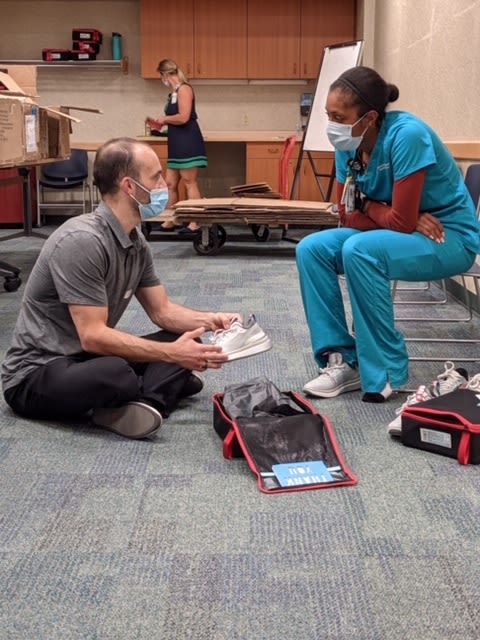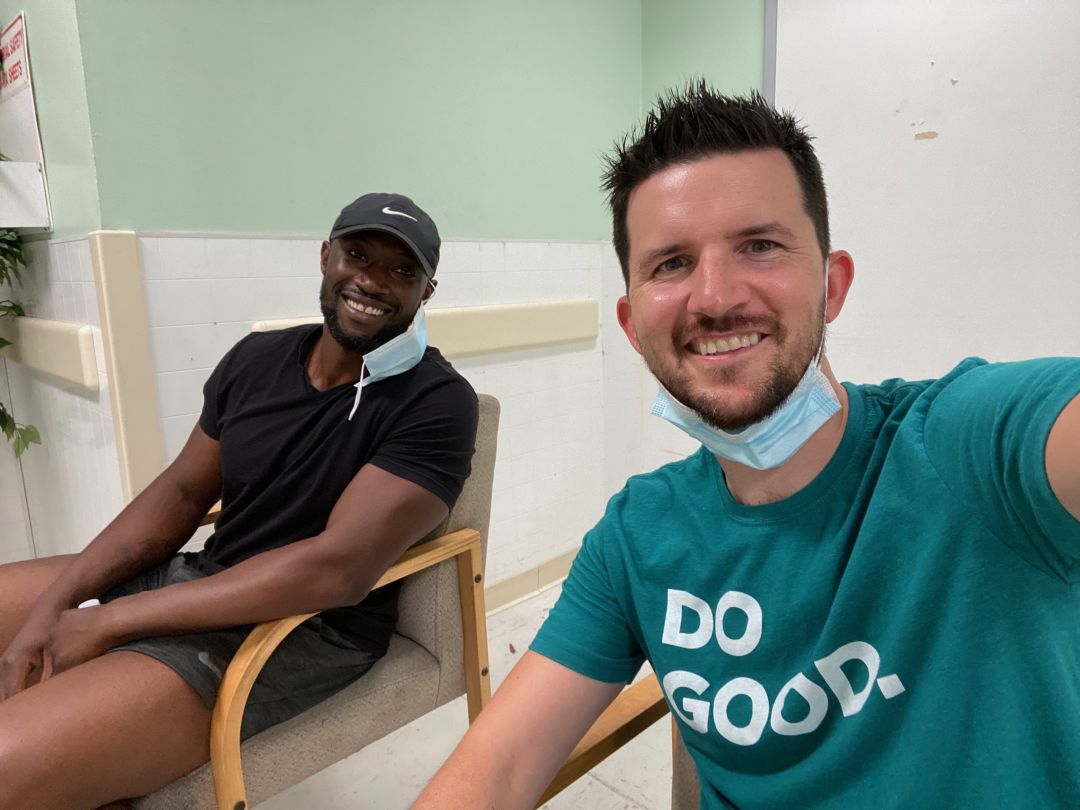Can Portland-based Shoemaker BALA Bounce Back?

BALA co-founder Brian Lockard with a nurse and a pair of Twelves, the company's signature shoe.
Image: Courtesy of BALA
When promising Portland start-up BALA footwear, which makes high performance shoes for nurses, first paired up with Ebi Porbeni, a nurse/social media influencer who built up over a million devoted Instagram followers on his @nurselifern channel, it seemed like a match made in marketing heaven.
The company, which was started by two former Nike employees, Brian Lockard, and John Eberle, had hit on a smart idea, without too much market competition. Their idea, born from a class on entrepreneurism that Eberle had taught at the University of Oregon’s Sports Product Management program, was to design a shoe expressly for nurses, who spend up to 12 hours a day on their feet—think Figs, the direct-to-consumer, now publicly traded fashion scrubs company that’s gone viral for its deviation from the standard Kelly-green jumpsuit vibe, only for shoes.
To develop their first line, known as Twelves in honor of those long shifts, Lockard and Eberle say they canvassed hundreds of nurses, to see whether they felt well-served by their existing options, which more often than not were running shoes or Swedish-style clogs, like those often sported by chefs.
“We were trying to show nurses the respect they deserve by treating them the way professional athletes are treated,” Lockard said. That meant developing a shoe that included a fluid-resistant outer layer (because all manner of bodily fluids are apt to splash onto a nurse’s feet during daily rounds), an inner bootie for comfort, rigid arch support to account for standing in one place for long periods of time, and a flexible sneaker sole for the inevitable sprints down a hallway when a patient is in need.
Caprice Neely, a footwear design veteran with experience at Nike, Under Armour, and Adidas, came on board as a co-founder and designed the prototype. Lockard and Eberle tapped contacts to find manufacturing facilities and source materials.

Porbeni and Smith pose together for a picture.
Image: Courtesy of Zach Smith
Here’s where Porbeni came in. Born in Nigeria and raised in Chicago, Porbeni had worked as a nurse at UCLA before moving into travel nursing, according to his LinkedIn. His Instagram account began as a collection of nurse-friendly memes, a collective place to blow off some steam and find the humor–often dark–in a profession that sees much more than its fair share of sorrow. Porbeni engaged with followers in his Instagram stories, via a popular podcast and through live Q and As; sweatshirts emblazoned with his signature sayings like “A&Ox1" (short for alert and oriented, in health care speak) sold out fast.
The account evolved into an intimate and free-ranging digital gathering space for the nursing community worldwide, says Zach Smith, a trained nurse turned tech start-up entrepreneur who founded Nurse Grid, a Portland-based nurse scheduling app and came on board early at BALA to help with marketing. Smith’s wife was a fan of Porbeni’s and encouraged recruiting him as the company’s public face; Smith says they hit it off right away, and became very close friends.
“Ebi felt like a gatekeeper to the nursing community, like they were not going to get taken advantage of, as they have been in the past,” Smith said. “He had the exact vibe that I was envisioning. He was so real, and he had a massive following.” Case in point: Smith says when Porbeni put out a survey to his followers about what they were looking for in a shoe, 30,000 responses poured in, giving BALA valuable information about everything from shoe sizes, preferred colors, how often the target market bought shoes, price points and more.
Instead of buying digital ads, Smith says, he and Porbeni suggested more viral marketing, with Porbeni demoing BALAs on his social media channels, plus a cheeky commercial featuring a nurse in an all-out-mad dash to get to a coveted piece of equipment for bladder scans before any of her colleagues.
The strategy paid off in spades. A presale of the shoes netted more than 7,000 orders to the tune of a million dollars, providing both needed capital and a calling card for future investors, Smith says. Lockard remembers filling the first round of orders in December of 2020; the company’s warehouse in Tigard was short staffed, so BALA employees pitched in to pack and ship out orders. Nurses later told the company that they’d gotten their shoes on the same day as they’d received their COVID vaccines, he said.
By the spring of 2021, though, relations had gotten strained. Often, social media influencers get paid per swipe, based off how many of their followers act on their recommendations, click and buy. Porbeni was different, Smith says: He had negotiated for equity in the company, with bonus percentage points to come once sales hit a certain level.
Smith says Porbeni was driving sales and pressing for more compensation and Lockard, in particular, was skeptical and resistant. For his part, Lockard says the two sides, “could not come to an agreement that would both satisfy his compensation requests and enable BALA to compensate our full-time employees fairly and run the business."
Eventually, Porbeni stopped promoting the shoes via his feeds, and there was an immediate sales slowdown, Smith says. To top things off, Porbeni was dealing with a rare form of leukemia, and getting progressively sicker, while waiting on a decision from his insurance company to cover a second round of treatment.
By June of 2021, Porbeni, Smith, and Neely had had enough. All three quit Bala, but said almost nothing at the time publicly about the decision. The company shed Instagram followers, by the thousands.
A month or so later, Porbeni died at the age of 33.
Within weeks, Neely posted a tribute to him on Instagram, saying that he had been “so full of amazing energy & ideas.,” and then adding the following pointed remarks: “One thing Ebi was not able to achieve in his short life was to receive the proper recognition, thanks and appreciation for what he did to build & support BALA…His promotion of BALA yielded close to 100 percent of the pre-sale sales and in my estimation, the vast majority of sales thereafter. He legitimized the brand for nurses.”
“He meant so much to a ton of people, with all that he did to advocate for better care for nurses,” Smith says. “And that shoe was as good as it was because of the surveys, the meetups, the wear testers, the commercial–all nurses from Ebi’s community, working for free. All of that left the company, because of Brian.”
Lockard and Eberle acknowledge that after the departures, which they point out are not unusual for start-ups that are finding their feet, sales took a sizable dip. But sales have since rebounded, they say, as BALA built new partnerships, and made plans to expand its products, including shoes geared toward other health care professionals, a slip-on style, and shoes for wider feet too.
Right now, their shoes are available primarily via their website; they want to expand to other online marketplaces and perhaps eventually open a brick-and-mortar store, too. (Someday, they said, they can envision making shoes designed specifically for other professionals who spent a good part of the day on their feet: think teachers, waiters, and more.)
Investments have continued to come in too; they recently closed a third round of funding that included an investment from the locally well-regarded Portland Seed Fund. And, Lockard says, they are expanding philanthropical efforts, including partnering with the Oregon Center for Nursing to help fund wellness support programs for pandemic-battered nurses.
Still, some of the scars of Porbeni’s exit linger. While the shoes get largely positive online reviews from nurses, on social media, Porbeni’s followers often pointedly respond to BALA’s social media posts with plant emojis in his honor—Porbeni’s favorite Sunday pastime was tending to his plants—a way of telling the company they haven’t forgotten the imbroglio.
“Starting a company is so different than any of the training that I had,” Eberle said during a recent interview at BALA’s Slabtown co-working space. “We are learning every day. We have so many opportunities coming at us, and our challenge always is to focus the team, focus the best ideas, and make sure we are still balancing them against the needs of health care professionals.”




